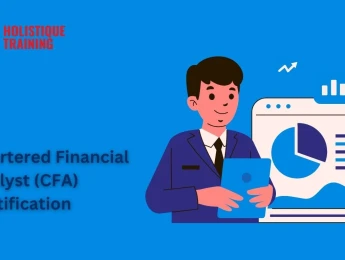As a business grows, it’s important to protect each department from financial risk. Financial professionals must understand asset allocation and distribute monetary assets between cash, bonds, stocks and shares, and real estate. This method helps to spread the risk of financial loss, meaning that when an issue arises, or a downturn in the market occurs, a business isn’t left struggling financially by putting all of its eggs in one basket.
To effectively manage a portfolio of assets, it’s important to understand the financial market across various sectors and keep up to date with changes based on software, technology, and sustainability requirements.
Understanding the terminology and best practices within the banking environment is important for making the best decisions and creating a beneficial asset portfolio to secure the business’s future.
When making portfolio amendments and decisions, it’s essential to review previous data, manage performance and monitor changes in the market. This performance measurement will help you to develop the best strategies going forward.
Upon completion of this course, participants will be able to:
- Develop an effective financial strategy based on previous portfolio monitoring.
- Understand financial terminology associated with asset management.
- Maintain the optimum portfolios for business continuity.
- Analyse the features of each portfolio and suggest a sensible strategic change.
- Assess a broad range of assets based on market change.
- Understand the effects of sustainable processing on your portfolios.
- Capture consistent data to fuel future development.
- Gain an advantage over competitors using market research.
- Understand the practical issues with multi-asset investments.
This course is designed for anyone responsible for developing or transforming financial asset portfolios to assist with making positive financial decisions. It would be most beneficial for:
- Business Owners
- Chief Financial Officers
- Account Managers
- Data Analysts
- Portfolio Construction Professionals
- Asset Management Specialists
- Project Managers
This course uses various adult learning techniques to aid full understanding and comprehension. Participants will review current market trends and examine various real-world examples to understand the positives and negatives of asset spreads.
They will undergo group discussions to create strategic project plans and review example datasets to identify where changes need to be made to secure business finances. They will be presented with the most up-to-date software options and tools to make accurate financial decisions, review the possible outcomes of their planned decisions, and learn how to create contingency plans for any errors.
Day 5 of each course is reserved for a Q&A session, which may occur off-site. For 10-day courses, this also applies to day 10
Section 1: Financial Trends in Asset & Portfolio Management
- The most recent changes and reasons for the changes in financial asset management.
- Understanding how sustainable processes can affect your decision-making.
- Software development to achieve more accurate data models.
- Rebalancing and reallocation of lost assets or failing financial changes.
- Putting the theory into practice.
- Basic tools and concepts.
Section 2: Equity, Real-estate & Building Allocation
- Asset allocation and portfolio construction.
- Alpha discovery in essential ratio balance.
- SMART Beta methodology.
- Measuring and monitoring accurately.
- Making decisions based on previous data.
- Investor behaviour and negotiation techniques.
- Asset class characteristics and models.
- Traditional vs. alternative asset classes.
Section 3: Fixed Income Allocation & Management
- An overview of bond issuers and bond types.
- Risks when opting for fixed income.
- Market fixed income options.
- Hedge ratio and asset SWAPs.
- Yield components, hedging, and convexity.
- Investing in hedge funding.
- Short selling, leverage, and derivatives.
Section 4: Managing Financial Risk
- Types of financial risk and how to measure them.
- Key ratios and measurements.
- Skewness and Kurtosis.
- Asset class exposure.
- Performance measurement and benchmarks.
- Understanding negative correlation.
Section 5: Understanding Private Equity
- Private equity definition and main sources.
- Constructing your private equity portfolio.
- Measuring performance and correlation.
- Current marketplace trends.
- Commodities management and monitoring.
Section 6: Structured Product Options
- Foreign exchange products.
- Index and basket certification.
- Cover warrants and mutual funding.
- Capital guarantee and protection.
- Vanilla products and portfolio protection.
- Maximum return on products and discount certificates.
- Derivatives and exchange trading.
- Ad hoc solutions, constructing and evaluating your portfolio.
Upon successful completion of this training course, delegates will be awarded a Holistique Training Certificate of Completion. For those who attend and complete the online training course, a Holistique Training e-Certificate will be provided.
Holistique Training Certificates are accredited by the British Assessment Council (BAC) and The CPD Certification Service (CPD), and are certified under ISO 9001, ISO 21001, and ISO 29993 standards.
CPD credits for this course are granted by our Certificates and will be reflected on the Holistique Training Certificate of Completion. In accordance with the standards of The CPD Certification Service, one CPD credit is awarded per hour of course attendance. A maximum of 50 CPD credits can be claimed for any single course we currently offer.
- Course Code PF1-122
- Course Format Classroom, Online,
- Duration 5 days














